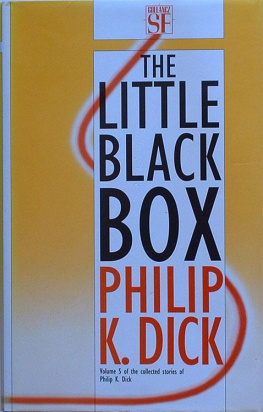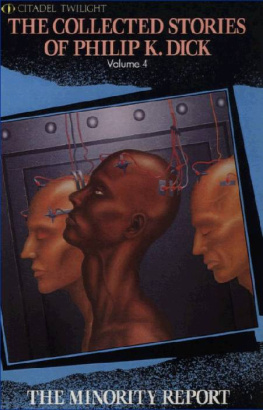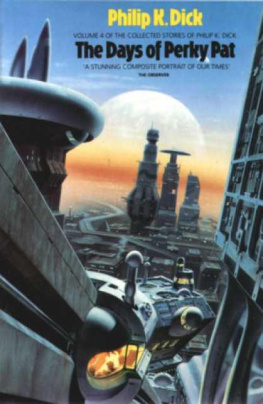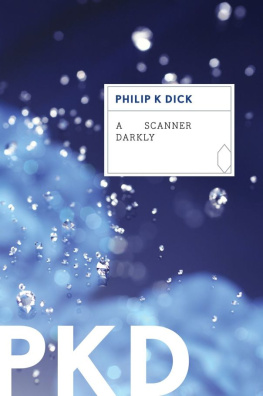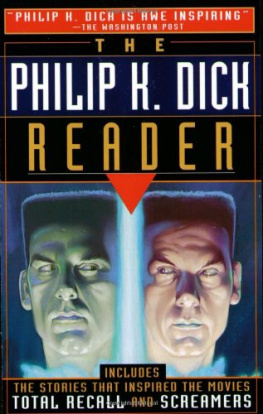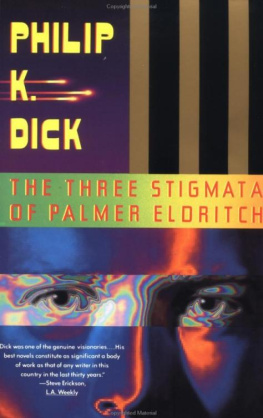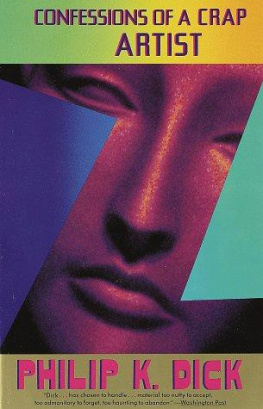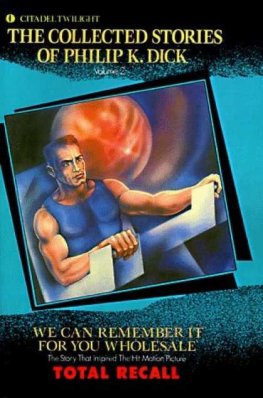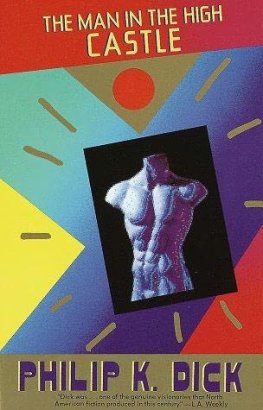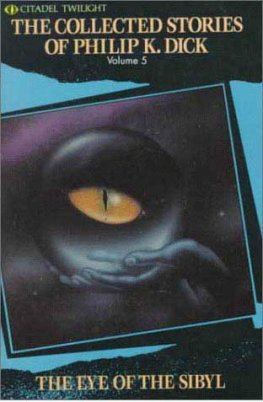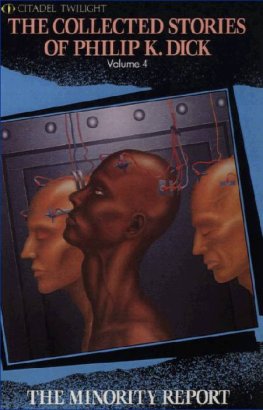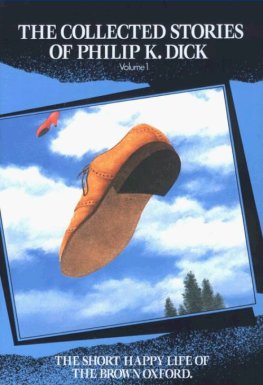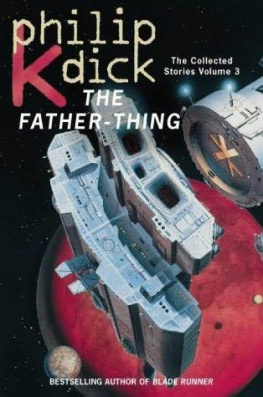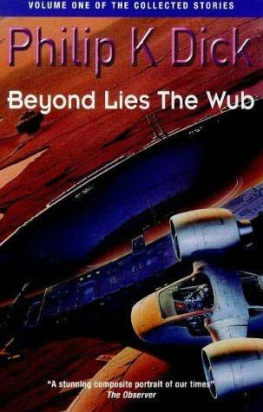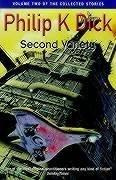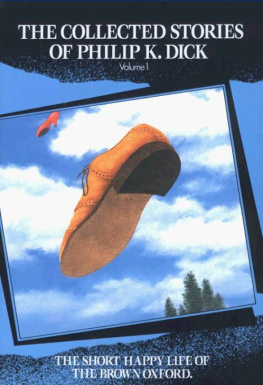The Collected Stories of Philip K. Dick Vol. 5
by Philip K. Dick
Introduction
By Thomas M. Disch
The conventional wisdomhas it that there are writers' writers and readers' writers. Thelatter are those happy few whose books, by some pheromonic chemistrythe former can never quite duplicate in their own laboratories,appear year after year on the best seller lists. They may or (moreusually) may not satisfy the up-market tastes of "literary"critics but their books sell. Writers' writers get great reviews,especially from their admiring colleagues, but their books don'tattract readers, who can recognize, even at the distance of a review,the signs of a book by a writers' writer. The prose style comes infor high praise (a true readers' writer, by contrast, would not wantto be accused of anything so elitist as "style"); thecharacters have "depth"; above all, such a book is"serious."
Many writers' writersaspire to the wider fame and higher advances of readers' writers, andoccasionally a readers' writer will covet such laurels as royaltiescannot buy. Henry James, the writers' writer par excellence wroteone of his drollest tales, The Next Time, about just such apair of cross-purposed writers, and James's conclusion is entirelytrue to life. The literary writer does his best to write ablockbuster -- and it wins him more laurels but no more readers. Thesuccessful hack does her damnedest to produce a Work of Art: thecritics sneer, but it is her greatest commercial success.
Philip K. Dick was, inhis time, both a writers' writer and a readers' writer; and neither;and another kind altogether -- a science fiction writers' sciencefiction writer. The proof of the last contention is to be foundblazoned on the covers of a multitude of his paperback books, wherehis colleagues have vied to lavish superlatives on him. John Brunnercalled him "the most consistently brilliant science fictionwriter in the world." Norman Spinrad trumps this with "thegreatest American novelist of the second half of the twentiethcentury." Ursula LeGuin anoints him as America's Borges, whichHarlan Ellison tops by hailing him as SF's "Pirandello, itsBeckett and its Pinter." Brian Aldiss, Michael Bishop, myself --and many others -- have all written encomia as extravagant, but allthese praises had very little effect on the sales of the books theygarlanded during the years those books were being written. Dickmanaged to survive as a full-time free-lance writer only by virtue ofhis immense productivity. Witness, the sheer expanse of theseCOLLECTED STORIES, and consider that most of his readersdidn't consider Dick a short story writer at all but knew him chieflyby his novels.
It is significant, Ithink, that all the praise heaped on Dick was exclusively from otherSF writers, not from the reputation makers of the LiteraryEstablishment, for he was not like writers' writers outside genrefiction. It's not for his exquisite style he's applauded, or hisdepth of characterization. Dick's prose seldom soars, and often islame as any Quasimodo. The characters in even some of his mostmemorable tales have all the "depth" of a 50s sitcom. (Amore kindly way to think of it: he writes for the traditionalcomplement of America's indigenous commedia dell-arte.) Evenstories that one remembers as exceptions to this rule can prove, onre-reading, to have more in common with Bradbury and van Vogt thanwith Borges and Pinter. Dick is content, most of the time, with anarrative surface as simple -- even simple-minded -- as a comic book.One need go no further than the first story in this book, TheLittle Black Box, for proof of this -- and it was done in 1963,when Dick was at the height of his powers, writing such classicnovels as THE MAN IN THE HIGH CASTLE and MARTIAN TIME-SLIP.Further, Box contains the embryo for another of his bestnovels of later years, DO ANDROIDS DREAM OF ELECTRIC SHEEP?
Why, then, such paeans?For any aficionado of SF the answer is self-evident: he had greatideas. Fans of genre writing have usually been able to toleratesloppiness of execution for the sake of genuine novelty, since thebane of genre fiction has been the constant recycling of old plotsand premises. And Dick's great ideas occupied a unique wave-band onthe imaginative spectrum. Not for him the conquest of space. In Dickthe colonization of the solar system simply results in new and moredismal suburbs being built. Not for him the Halloween mummeries ofinventing new breeds of Alien Monsters. Dick was always too consciousof the human face behind the Halloween mask to bother with elaboratemasquerades. Dick's great ideas sprang up from the world around him,from the neighborhoods he lived in, the newspapers he read, thestores he shopped in, the ads on TV. His novels and stories taken alltogether comprise one of the most accurate and comprehensive picturesof American culture in the Populuxe and Viet Nam eras that exists incontemporary fiction -- not because of his accuracy in the matter ofinventorying the trivia of those times, but because he discoveredmetaphors that uncovered the meaning of the way we lived. Hemade of our common places worlds of wonder. What more can we ask ofart?
Well, the answer isobvious: polish, execution, economy of means, and other estheticniceties. Most SF writers, however, have been able to get alongwithout table linen and crystal so long as the protein of a meatymetaphor was there on the plate. Indeed, Dick's esthetic failingscould become virtues for his fellow SF writers, since it is so oftenpossible for us to take the ball he fumbled and continue for atouchdown. Ursula LeGuin's THE LATHE OF HEAVEN is one of thebest novels Dick ever wrote -- except that he didn't. My own 334would surely not have been the same book without the example ofhis own accounts of Future Drabness. The list of his consciousdebtors is long, and of his unconscious debtors undoubtedly evenlonger.
Phil's own note at theback of this book to his story The Pre-Persons provides anilluminating example of the kind of reaction he could have on afellow writer. In this case Joanna Russ allegedly offered to beat himup for his tale of a young boy's apprehension by the driver of alocal "abortion truck," who operates like a dog catcher inrounding up Pre-Persons (children under 12 no longer wanted by theirparents) and taking them into "abortion" centers to begassed. It's an inspired piece of propaganda (Phil calls it "specialpleading"), to which the only adequate response is surely not athreat to beat up the author but a story that dramatizes the sameissue as forcefully and that does not shirk the interesting buttrouble-making question: If abortion, why not infanticide?Dick's raising of this question in the current polarized climate ofdebate was a coup de theatre but scarcely the last word on thesubject. One could easily extrapolate an entire novel from theessential premise of The Pre-Persons, and it wouldn'tnecessarily be an anti-abortion tract. Dick's stories often floweredinto novels when he re-considered his first good idea, and the reasonhe is a science fiction writers' science fiction writer is becausehis stories so often have had the same effect on his colleagues.Reading a story by Dick isn't like "contemplating" afinished work of art. Much more it's like becoming involved in aconversation. I'm glad to be a part, here, of that continuingconversation.
ThomasM. Disch
October,1986
How does one fashion abook of resistance, a book of truth in an empire of falsehood, or abook of rectitude in an empire of vicious lies? How does one do thisright in front of the enemy?
Not through theold-fashioned ways of writing while you're in the bathroom, but howdoes one do that in a truly future technological state? Is itpossible for freedom and independence to arise in new ways under newconditions? That is, will new tyrannies abolish these protests? Orwill there be new responses by the spirit that we can't anticipate?
Next page
